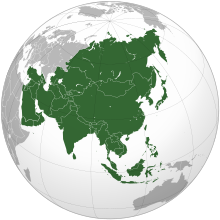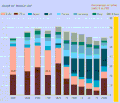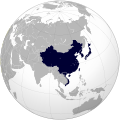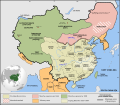Portal:Asia

 Asia (/ˈeɪʒə/ ⓘ AY-zhə, UK also /ˈeɪʃə/ AY-shə) is the largest continent in the world by both land area and population. It covers an area of more than 44 million square kilometers, about 30% of Earth's total land area and 8% of Earth's total surface area. The continent, which has long been home to the majority of the human population, was the site of many of the first civilizations. Its 4.7 billion people constitute roughly 60% of the world's population. Asia shares the landmass of Eurasia with Europe, and of Afro-Eurasia with both Europe and Africa. In general terms, it is bounded on the east by the Pacific Ocean, on the south by the Indian Ocean, and on the north by the Arctic Ocean. The border of Asia with Europe is a historical and cultural construct, as there is no clear physical and geographical separation between them. It is somewhat arbitrary and has moved since its first conception in classical antiquity. The division of Eurasia into two continents reflects East–West cultural, linguistic, and ethnic differences, some of which vary on a spectrum rather than with a sharp dividing line. A commonly accepted division places Asia to the east of the Suez Canal separating it from Africa; and to the east of the Turkish Straits, the Ural Mountains and Ural River, and to the south of the Caucasus Mountains and the Caspian and Black seas, separating it from Europe. China and India traded places as the largest economies in the world from 1 to 1800 CE. China was a major economic power for much of recorded history, with the highest GDP per capita until 1500. The Silk Road became the main east–west trading route in the Asian hinterlands while the Straits of Malacca stood as a major sea route. Asia has exhibited economic dynamism as well as robust population growth during the 20th century, but overall population growth has since fallen. Asia was the birthplace of most of the world's mainstream religions including Hinduism, Zoroastrianism, Judaism, Jainism, Buddhism, Confucianism, Taoism, Christianity, Islam, Sikhism, as well as many other religions. (Full article...) Featured articleThe Battle for Henderson Field, also known as the Battle of Guadalcanal or Battle of Lunga Point by the Japanese, took place from 23 to 26 October 1942 on and around Guadalcanal in the Solomon Islands. The battle was a land, sea, and air battle of the Pacific campaign of World War II and was fought between the Imperial Japanese Army and Navy and Allied forces, mainly U.S. Marines and Army. The battle was the last of three major land offensives conducted by the Japanese during the Guadalcanal campaign. In the battle, U.S. Marine and Army forces repulsed an attack by the Japanese 17th Army under the command of Lieutenant General Harukichi Hyakutake. The American forces were defending the Lunga perimeter that guarded Henderson Field on Guadalcanal, which the Allies had captured from the Japanese in landings on Guadalcanal on 7 August 1942. Hyakutake's force was sent to Guadalcanal in response to the Allied landings with the mission of recapturing the airfield and driving the Allied forces off the island. His soldiers conducted numerous assaults over three days at various locations around the Lunga perimeter, all repulsed with heavy Japanese losses. At the same time, Allied aircraft operating from Henderson Field successfully defended American positions on Guadalcanal from attacks by Japanese naval air and sea forces. (Full article...)Selected Country Jordan, officially the Hashemite Kingdom of Jordan, is a country in the Southern Levant region of West Asia. Jordan is bordered by Syria to the north, Iraq to the east, Saudi Arabia to the south, and the occupied Palestinian territory of the West Bank and Israel to the west. The Jordan River, flowing into the Dead Sea, is located along the country's western border. Jordan has a small coastline along the Red Sea in its southwest, separated by the Gulf of Aqaba from Egypt. Amman is Jordan's capital and largest city, as well as the most populous city in the Levant. Modern-day Jordan has been inhabited by humans since the Paleolithic period. Three kingdoms emerged in Transjordan at the end of the Bronze Age: Ammon, Moab and Edom. In the third century BC, the Arab Nabataeans established their Kingdom centered in Petra. Later rulers of the Transjordan region include the Assyrian, Babylonian, Roman, Byzantine, Rashidun, Umayyad, Abbasid, and the Ottoman empires. After the Great Arab Revolt against the Ottomans in 1916 during World War I, the Greater Syria region was partitioned by Britain and France. The Emirate of Transjordan was established in 1921 by the Hashemite, then Emir, Abdullah I, and the emirate became a British protectorate. In 1946, Jordan gained independence and became officially known as the Hashemite Kingdom of Jordan. The country captured and annexed the West Bank during the 1948 Arab–Israeli War until it was occupied by Israel in 1967. Jordan renounced its claim to the territory to the Palestinians in 1988, and signed a peace treaty with Israel in 1994. (Full article...)Featured biographyAbū Bakr Muḥammad ibn Ṭughj ibn Juff ibn Yiltakīn ibn Fūrān ibn Fūrī ibn Khāqān (8 February 882 – 24 July 946), better known by the title al-Ikhshīd (Arabic: الإخشيد) after 939, was an Abbasid commander and governor who became the autonomous ruler of Egypt and parts of Syria (Levant) from 935 until his death in 946. He was the founder of the Ikhshidid dynasty, which ruled the region until the Fatimid conquest of 969. The son of Tughj ibn Juff, a general of Turkic origin who served both the Abbasids and the autonomous Tulunid rulers of Egypt and Syria, Muhammad ibn Tughj was born in Baghdad but grew up in Syria and acquired his first military and administrative experiences at his father's side. He had a turbulent early career: he was imprisoned along with his father by the Abbasids in 905, was released in 906, participated in the murder of the vizier al-Abbas ibn al-Hasan al-Jarjara'i in 908, and fled Iraq to enter the service of the governor of Egypt, Takin al-Khazari. Eventually he acquired the patronage of several influential Abbasid magnates, chiefly the powerful commander-in-chief Mu'nis al-Muzaffar. These ties led him to being named governor first of Palestine and then of Damascus. In 933, he was briefly named governor of Egypt, but this order was revoked after the death of Mu'nis, and Ibn Tughj had to fight to preserve even his governorship of Damascus. In 935, he was re-appointed to Egypt, where he quickly defeated a Fatimid invasion and stabilized the turbulent country. His reign marks a rare period of domestic peace, stability and good government in the annals of early Islamic Egypt. In 938 Caliph al-Radi granted his request for the title of al-Ikhshid, which had been borne by the rulers of his ancestral Farghana Valley. It is by this title that he was known thereafter. (Full article...)General imagesThe following are images from various Asia-related articles on Wikipedia. Featured picture Credit: Diliff The Kayan or Padaung are a group of the Karen people found in Myanmar and Thailand. They are known for a particular body modification, which consists of coiling lengths of brass around the neck of the women. The coils are first applied when the girls are about five years old, and the coil is replaced with longer coils as the weight of the brass pushes down the collar bone and compresses the rib cage, resulting in the appearance of a very long neck. The practice has seen a surge in recent years because the custom draws tourists who buy their handicrafts.
Did you know...
Updated: 6:33, 14 February 2024 In the news
Related portalsMajor Religions in Asia Middle East Central Asia and Surroundings Indian Subcontinent Southeast Asia East Asia Selected panorama
The Ratchaprasong and Sukhumvit skylines of Bangkok, the capital of and largest city in Thailand, with Lumphini Park in the center, as viewed from the Sathon District. Known in Thai as Krung Thep ("city of angels"), it became the capital in 1768 after the destruction of Ayutthaya by Burmese invaders. TopicsCategoriesAssociated WikimediaThe following Wikimedia Foundation sister projects provide more on this subject:
More portalsShortcuts to this page: Asia portal • P:ASIA Purge server cache |





























































































